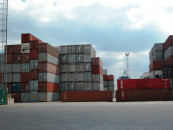A little faith goes a long way: Why corporate Pakistan thinks the future is bright
Opportunities abound in the coming investment period.

Companies have actually shown a willingness to take on debt to finance growth. PHOTO: FILE
“The food and power sectors are a firm favorite in the overall investment theme, from the perspective of both incumbents and new entrants,” said Farrukh Khan, a research analyst at KASB Securities, in a note issued to clients on Tuesday.
While KASB was unwilling to comment on specifics, over the past several months there have been indications by companies of such investment trends. Coca Cola, for example, is investing $379 million in Pakistan over the next three years to keep up with rising demand. Dairy in particular is seen as a lucrative market. Nestlé’s Milkpak will be investing more than $300 million in the Pakistani dairy sector, with the hopes of more than doubling its output of milk. The Nishat Group, whose main interests lie in textiles and cement manufacturing, is also venturing out into the food sector with its own dairy company. These announcements come at a time of a general surge in the FMCG sector: FMCG profits grew at 21.7% per year between 2006 and 2011, according to the State Bank of Pakistan.
Fauji Fertilizer best represents the upcoming change. The military-owned company is hitching on to the FMCG bandwagon as well, looking at investments in the dairy market, where there is currently a very low level of penetration of branded goods. But the move is also a step towards diversification, in an attempt to not follow in Engro’s footsteps of natural gas over reliance, whose $1.1 billion manufacturing unit was shut down in 2011 owing to a lack of gas caused by low supply and extremely high demand due to subsidised prices. Even though gas production will decrease in the future, it has somewhat stabilised for now, but according to the KASB report, the move from subsidised prices to market prices is going to hurt. Fauji Fertilizer seems to want to counter that pinch with its own entry into the food sector.
The power sector is marked by a huge investment opportunity in the form of coal conversion. This is because of the undeniable fact that natural gas production is expected to fall - and continue to fall - starting from 2014. Considering that in the in the current energy plan the government can only afford coal or natural gas to run state-owned power plants, this means an increase in demand for coal. Even private sector companies are moving away from oil fired plants to coal fired ones, such as AES Lalpir, currently in the process of conversion.
These trends were already slowly catching on in recent years but have been immensely sped up by the arrival of one man: Nawaz Sharif. PML-N’s decisions to end the circular debt of Rs500 billion, resolve the energy crisis and introduce lower interest rates have all been met with strong approval by corporate Pakistan.
But what is different in this case is that companies have actually shown a willingness to take on debt to finance growth, suggesting a much more long-term belief in the political structure and the economy. This leads to the kind of risk-taking decisions. Thus the real message that corporate Pakistan is giving out is out isn’t just optimism, its faith.
Published in The Express Tribune, July 10th, 2013.
Like Business on Facebook, follow @TribuneBiz on Twitter to stay informed and join in the conversation.


















COMMENTS
Comments are moderated and generally will be posted if they are on-topic and not abusive.
For more information, please see our Comments FAQ